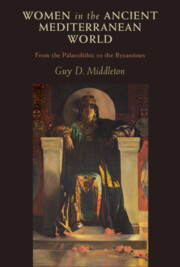Book contents
- Women in the Ancient Mediterranean World
- Women in the Ancient Mediterranean World
- Copyright page
- Dedication
- Epigraph
- Contents
- Preface
- Acknowledgements
- Timeline
- Historical Contexts
- Introduction
- Part I The Deep Past
- Part II The Bronze Age
- 4 Merneith
- 5 Šimatum and Kirum
- 6 The Woman of La Almoloya
- 7 The Priestess of Anemospilia
- 8 Hatshepsut
- 9 Puduhepa
- 10 Eritha and Karpathia
- 11 Hatiba
- Part III The Iron Age
- Part IV The Hellenistic Worlds
- Part V The Age of Empire
- Notes
- Select Bibliography
- Index
5 - Šimatum and Kirum
from Part II - The Bronze Age
Published online by Cambridge University Press: 19 January 2023
- Women in the Ancient Mediterranean World
- Women in the Ancient Mediterranean World
- Copyright page
- Dedication
- Epigraph
- Contents
- Preface
- Acknowledgements
- Timeline
- Historical Contexts
- Introduction
- Part I The Deep Past
- Part II The Bronze Age
- 4 Merneith
- 5 Šimatum and Kirum
- 6 The Woman of La Almoloya
- 7 The Priestess of Anemospilia
- 8 Hatshepsut
- 9 Puduhepa
- 10 Eritha and Karpathia
- 11 Hatiba
- Part III The Iron Age
- Part IV The Hellenistic Worlds
- Part V The Age of Empire
- Notes
- Select Bibliography
- Index
Summary
Arranged marriages have been commonplace through history and, according to Kennon Rider and Ann Swallow, are still the norm for around half the population of the world.1 They can take several forms, for example, when parents and family select one or more potential marriage candidates, but the child can make a choice between them or refuse a particular individual. An arranged marriage can also be a forced marriage, in which one or both parties are given no choice in their marriage partner. In western culture, arranged marriages tend to be viewed negatively now because a cultural emphasis is placed on romantic love as the main factor in making a ‘proper’ or successful marriage; arranged marriages have, from a western perspective, been seen as primitive and inherently unhappy.2 However, ‘successful’ or at least enduring marriages are more common in arranged marriage cultures, although this may be due to the difficulty and stigma of divorce; love may also develop in arranged marriages and is not unimportant. Marriage in these terms can sometimes be thought of as a partnership and a joint project to be worked on. It can be a way of building and cementing alliances between individuals and families, controlling property and wealth, and of producing legitimate children.
- Type
- Chapter
- Information
- Women in the Ancient Mediterranean WorldFrom the Palaeolithic to the Byzantines, pp. 62 - 67Publisher: Cambridge University PressPrint publication year: 2023



